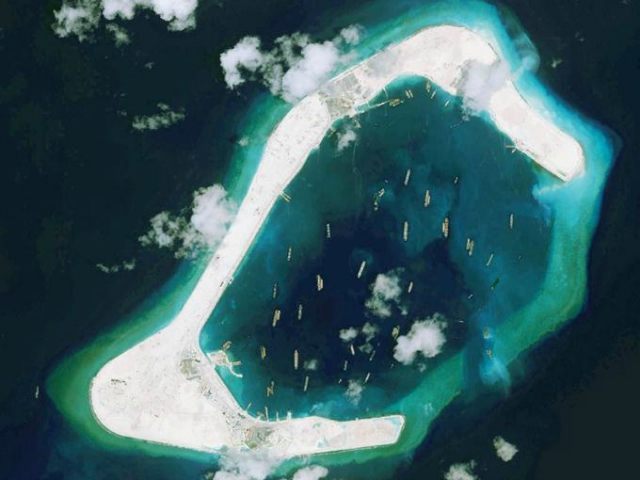The head of China’s military operations in the South China Sea threatened this weekend to use force to “deal with any security threat” in the region, asserting that “China’s sovereignty” in the region — highly disputed by its neighbors — was worth deploying the military.
General Wang Jiaocheng, who runs the People’s Liberation Army Southern Theatre Command, told reporters his soldiers were ready to respond to any “threat” in the region. “The military will be capable of dealing with any security threat. No country will be allowed to use any excuse or action to threaten China’s sovereignty and safety,” he said, adding that “maritime defense” was paramount for the military in his region. “The foremost mission is to safeguard rights and interests in the South China Sea,” he noted.
China claims most of the South China Sea, with Foreign Minister Wang Yi asserting during a joint press conference with American Secretary of State John Kerry that “the islands in the South China Sea have been China’s territory since ancient times,” and Beijing has no intention of addressing any challenging claims. There is no international legal precedent for China’s claims, however, and the nations of Vietnam, the Philippines, Brunei. Malaysia, and Taiwan all dispute China’s claims. As China does not recognize Taiwan’s sovereignty, Beijing has used Taiwanese claims as evidence China has legal control over the territory Taiwan claims.
Wang Jiaocheng’s comments indicate that China is willing to use military force against non-Chinese travelers passing freely through the South China Sea, near China’s new constructions in the region. China has been constructing artificial islands and aircraft landing strips on reefs in the South China Sea in the past two years, mostly in the Spratly and Paracel Island chains. This month, satellite evidence revealed that China has placed surface-to-air missiles and fighter jets in the Paracel Islands, as well as beginning the construction of an advanced radar system in the Spratly Islands.
The Philippines has taken their case of sovereignty over the Spratly Islands to the Permanent Court of Arbitration at The Hague. China has vowed to completely disregard the case. “China’s non-acceptance and non-participation in arbitration on the South China Sea issue has full legal basis and the U.S. should respect the rights enjoyed by members of UN Convention on the Law of the Sea (UNCLOS), a group which it is not a member of,” Foreign Ministry spokesman Hong Lei said Monday of the case. China cites its own unilateral declaration that “arbitration and other compulsory dispute settlement procedures do not apply” as the legal basis for their refusal to accept that the case is underway.
In addition to Wang Jiaocheng’s comments and evidence of militarization in the region, the Chinese military is boasting new equipment through its propaganda channels. This weekend, the People’s Daily reported that China’s navy conducted a live-ammunition in the region, and is planning to introduce a domestically-manufactured military cargo jet to its fleet. Chinese state-controlled media has also continued to insist the United States disregard China’s behavior in the region after the U.S. Navy conducted two “freedom of navigation” exercises in the South China Sea in the past year and has promised many more.
“Instead of keeping a neutral position in territorial disputes, the Obama administration accuses China of worsening the scenario over the waters through political dialogues with the Philippines, Vietnam and other states who boast rival claims,” the editors of the state-run Global Times allege, warning that America is “drawing ruin upon itself” by challenging China’s widely discredited claims in the region. The Global Times has also threatened India after a rumor began to circulate that the Indian government is looking to work with the United States in the region. “In economy, politics and security, China is far more capable of making trouble for India than the reverse,” a Global Times editorial reads, warning America seeks to turn India “into a ‘vassal state’ like Japan and Australia.”

COMMENTS
Please let us know if you're having issues with commenting.